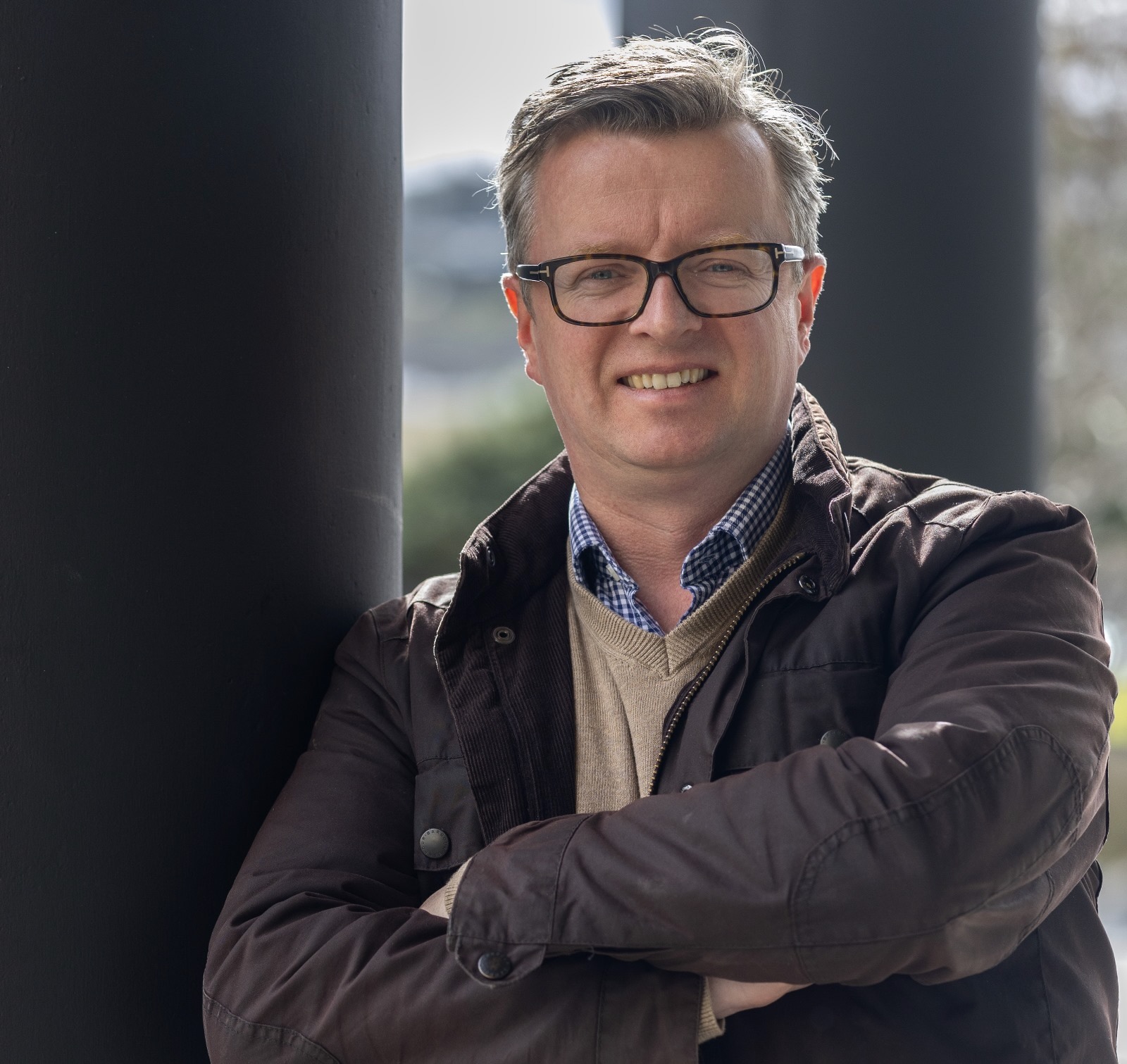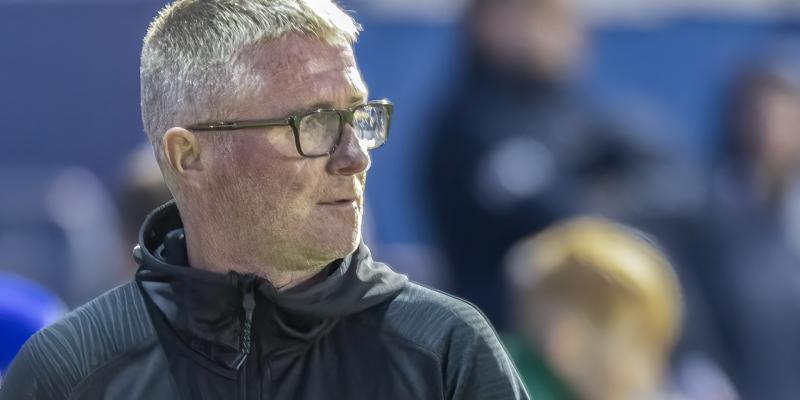
Finn Park, the home of Finn Harps FC. Photo: Sportsfile
When Finn Harps was first accepted into the League of Ireland, in 1969, the established members were aghast.
“My God, they have elected a team with a set of goalposts and two junior players to the league. Now I have seen everything,” blasted Bill Kelly, then of the Sunday Press.
Since then, Harps have outlasted a vast number of clubs who have gone bust, including Cork Hibernians, whose representative, Dan Morrissey, wondered on the night of Harps’ elevation to the League of Ireland: “If you were admitted to the League, how do you expect Cork Hibs to get to Donegal?”
The Harps manager, Pasty McGowan, hit back: “Mr Morrissey, if we are admitted, we will get to Cork; how you get to Donegal is your affair!”.
That sense defiance remains down Navenny Street.
“The ability of Finn Harps to survive is just astonishing,” Aidan Campbell, the club’s Commercial and Marketing Officer, says.
“The amount of times I have thought it was gone…It is a very unique club. It is a very unique atmosphere. We can’t offer the best facilities in the world, but what we can offer is the atmosphere around the club. Everyone is there, rowing in together, trying to make this mini miracle that is Finn Harps happen.”
The challenges - particularly those of a financial and geographic nature - remain as tough as ever.
Next month, shareholders are expected to be briefed on the club’s latest accounts and some of the figures are eye-watering.
Harps Chairman Ian Harkin says that, for example, they are spending over €100,000 a year on hiring facilities for training and academy matches while transport costs - something the club has raised with the FAI - are now “well over €100,000 a year”.
“There is a huge cost,” Harkin tells Donegal Live. “From a cash flow perspective, it is dead money going out of the club.”
The spend relates to the 11 teams currently being fielded by Harps, including the first team, four National League boys’ teams and two National League girls’ teams.
The first team budget in 2022, when Harps were last in the First Division, Harkin says was €14,500. Current boss Darren Murphy is operating off a figure that is “not far off half that”.
“Thats what we can afford now,” Harkin says. “ “Had we not gone down that time, we would’ve been in trouble because staying up is very expensive.”

Finn Harps Chairman Ian Harkin. (North West Newspix)
Last season, Harps travelled over 11,000km for away games. Cork City’s promotion and the relegation of Dundalk will reduce that somewhat, but the mileage punched in by Harps dwarfs that of other League of Ireland clubs. Instead of overnight stays, there will be more red-eye bus journeys back to Donegal after matches this season.
Towards the end of 2024, Harps rolled out a new membership and ownership scheme where patrons pay an annual fee of €25. An initial target of 3,000 remains some way off with “just over 1,600” sold. Geography proved a major impediment to attracting outside investment; more specifically, the chairman says, the club’s distance from Dublin Airport “just isn’t as attractive as some clubs closer to Dublin”.
Behind-the-scenes changes have been significant, too, with secretary Rory White set to vacate his role and take up what has been called “a new football role” on the Board. Barry Patton has stepped down from a role on the Board and Aidan McNelis has signalled his intention to do likewise.
The arrival of Cappry native and digital media consultant Katrina McBride is anticipated as a positive move with a target of 3,500 for memberships in the “short-term” and 5,000 by the end of the year.
Harkin also wants Harps to appoint a Chief Executive-type person.
“It is totally unsustainable what some of us are putting in at the moment,” he says. “That role will pay for itself, either in cost savings or adding revenue.”
The club has also, in the last 12 months, spent around €60,000 on a variety of professional fees related to the development of a new stadium in Stranorlar. The club has to raise its own €1.3million to go towards a project that will, at its latest estimate, cost around €8million.
“That is cash that, from an operational perspective, to take out of your pocket is very difficult,” Harkin says.
Changes to UEFA’s solidarity payments system, which dramatically reduce payments to First Division clubs in Ireland, have hit Harps hard. Although the actual pot of money to the League of Ireland has increased, the payments for a club such as Harps drops to €45,000, a reduction of €30,000 per annum.
“It makes a huge difference to our academy if the government doesn’t make up that shortfall,” Murphy says. “That puts another strain on everyone to find that money.”

Finn Harps Manager Darren Murphy. (North West Newspix)
The long-halted development of the stadium - first mooted to Finn Harps Co-Operative Society Ltd shareholders just over 20 years ago - is something of a noose around the club.
“The number one priority is the stadium and that is why I accept the boundaries I have to work in,” Murphy says. “I get every bit as much joy at watching Oisin Cooney play for Ireland Under-19s as I would watching a player who cost me €1,000-a-week scoring a goal. It’s about the progression of the football club. If we get the stadium, a lot of the costs would be addressed.”
When Harkin first took the chair, the Board was solely focussed on its first team and, at that time, Sean O’Donnell was the sole academy graduate in the Harps first team squad. This season, there will be 10 with Josh Cullen, Adam McDaid and Corey Sheridan all having signed deals this week.
Cooney, Aaron McLaughlin and Gavin McAteer have all had cross-channel trials in recent months. Cooney spent time at Nottingham Forest, Ipswich Town and Newcastle, McLaughlin has been at Stoke City and McAteer - who is this week on international duty with the Ireland U17s in Spain - has earned a second trial spell at Forest.
“There are clubs out there who out-perform the market,” Harkin says, “and there are multiple examples of that across Europe so we are fortunate to have a very good academy.
“We are not just ticking boxes with the academy players; these guys are there on merit.”
While Murphy will lean heavily on his senior leadership group - Tony McNamee, Conor Tourish and Mikey Place - the youngsters will be central to whatever tale will be written about Harps in 2025.
Contacts forged through his previous and current role have enabled Murphy to be active in the market, even if operating with a reduced spending power.
The arrival of Dara McGuinness, who had a spell at Stoke City’s academy, and goalkeeper David Aziaya are two such examples.
Harps have lost nine players from the 2024 squad, including top scorer Success Edogun who has got a “bigger and better deal” at Ballymena United in the Irish League, but Murphy has remained realistic.
“A good coach should always lose the best players,” he points out. “There have been 40 years of the First Division and Harps have only spent 12 of that 40 in the Premier Division. They’ve spent 28 in the First Division.
“We are not a massive Premier Division club. The model hasn’t worked - the facts and figures will tell you that.
“You have to have a model that means that we’re ready when we go back - that means producing your own and when they’re good enough and you lose them, you’ll have another one coming behind.”
Any new recruits will see a club heavily reliant on a small pool of people. Take Shane Elliott, for example, who works on admin at the club as well as being licencing officer and kitman.
Murphy recently suggested that the players could take responsibility for washing their own kit. The manager recalled how the Ballybofey man’s answer struck a chord: “No, that’s my job. We mightn’t be able to give them too much so we’re not taking away the things we can give them.”
Connections are invaluable at a club like Harps.
A successful charity partnership with the Bluestack Special Needs Foundation has come back to the club. After a clarion call by Board members for available accomodation for some of the club’s players was answered by someone with close ties to the charity, while Harps expect new sponsors, the Kernan Group (owned by former Harps player Anthony Kernan) to be a massive influence.
Kernan’s are the first top-to-bottom sponsor in Harps’ history with the company’s logo to feature on the kit of all teams within the club.
“They are out in the community themselves and you’ll see Harps video content at all their till points right around the county,” Harkin says. “They are an amazing partner to work with.”
While Harps are counting the pennies before spending, Murphy sees his peers at Cobh Ramblers, Athlone Town and Kerry FC with increased investment of late.
A lack of available training facilities - not to mention the cost - is proving a real challenge.
“It has been hugely difficult wherever we have gone,” Murphy says. “All the teams at the football club are in the same boat. Our spend across the board is phenomenal.
“You would get some loan out of the bank for what we are spending on facility hire.”
Subscribe or register today to discover more from DonegalLive.ie
Buy the e-paper of the Donegal Democrat, Donegal People's Press, Donegal Post and Inish Times here for instant access to Donegal's premier news titles.
Keep up with the latest news from Donegal with our daily newsletter featuring the most important stories of the day delivered to your inbox every evening at 5pm.